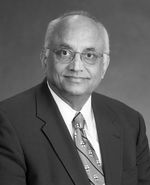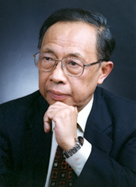SEMINAR
Globalization, Science and Technology and the Public Good
讲座时间:
讲座地点:邵科馆212会议室
主讲人:Prof Venkatesh Narayanamurti,
Foreign Secretary of the
Abstract:
In this talk I will spend most of my time in addressing three questions:
1. What does it mean to be a leading and societally relevant university in an increasingly globalized world?
2. What does it mean to be a broadly educated person in the 21st century?
3. What should radically innovating R&D institutions look like?
My views are shaped from my own personal experiences in industry, research intensive universities and in U.S national laboratories. I will review what is known about the processes of innovation and the role of engineering as a linking discipline with the society at large. It is well known from economic studies that technology plays a central part in development. With the evolution of the Internet and the pervasive use of Information technology, globalization has become a potent force and new multi-national companies and power houses have emerged. The G-8 group of nations has evolved to G-20. Many of the societal grand challenges, such as energy and sustainability, require global solutions. We must therefore prepare engineering graduates for this new environment. I like to say we need to educate “renaissance engineers”- those who understand not only how things work but also how the world works. This necessarily requires a new breed who are able to relate to societal well- being! It also requires new institutional modalities which allow holistic and integrated problem solving.
In the final part of my talk I review the specifics of the key ingredients of successful R&D institutions. I will focus on the special case of Bell Labs which has been described recently as the “Idea Factory and the great age of American Innovation” by the N.Y Times magazine writer Jon Gertner. I will discuss the need for institutions that transcend the “basic-applied” dichotomy and who rather bring research across domains into deeper congress. The need f or such new integrative institutions to address global challenges in areas such as alternative energy will be discussed.
About the speaker:

Venkatesh Narayanamurti is the Benjamin Peirce Professor of Technology and Public Policy and a Professor of Physics at Harvard. He is also the Director of the Science, Technology and Public Policy Program at the
SEMINAR
Renaissance, Engineering Philosophy and Electric Vehicles
讲座时间:
讲座地点:邵科馆212会议室
主讲人: Prof. C.C. Chan, FIEEE, FIET, FHKIE;
Fellow,
Academician, Chinese
Abstract:
To cope with the current complex economical, societal and technical challenges in the new era, it is vital to be open-minded. Namely, it means to integrate the Chinese ancient civilization and the western modern civilization, and to uphold the spirit of renaissance. Renaissance scientists and engineers are those not only understand Why and How Things work but also on Why and How the World works. The characters of renaissance scientists and engineers can be summarized as 1. Global thinking instead of local thinking; 2. Circle thinking instead of linear thinking; 3. Closed loop thinking instead of open loop thinking; 4. Life cycle thinking instead of partial life thinking; and 5. Harmony thinking between human and nature. In short, we should have all round universe perspectives. We should be open-minded. The seminar will discuss the relation and distinct features of Science, Technology, Engineering and Innovation. The key of philosophy of engineering and the principles of integrated system design. We should promote the philosophy of engineering, which is system integration, including vertical integration and horizontal integration. The seminar will also discuss the grand challenges of science and technology, as well as the overview of global electric vehicle development.
About the speaker: Prof. C. C. Chan holds BSc, MSc, PhD, HonDSc, HonDTech degrees. Honorary Professor and Former Head of the Department of Electrical and Electronic Engineering of the University of Hong Kong; Visiting Professor of MIT, University of Cambridge, etc; Founding President of the World Electric Vehicle Association; Senior Consultant to governments and industries; Fellow of the Royal Academy of Engineering, U.K., Chinese Academy of Engineering, IEEE, IET and HKIE. Recipient of Royal Academy of Engineering Prince Philip Medal; World Federation of Engineering (WFEO) Medal of Engineering Excellence; Gold Medal of Hong Kong Institution of Engineers; IEE International Lecture Medal; “Asia’s Best Technology Pioneers” by Asiaweek; “Father of Asian Electric Vehicles” by Magazine Global View; “Pitamaha (Grandfather) of Electric Vehicle Technology” in India; “Environmental Excellence in Transportation Award” by Society of Automotive Engineers (SAE); published 11 books, over 300 technical papers and holds 9 patents.

